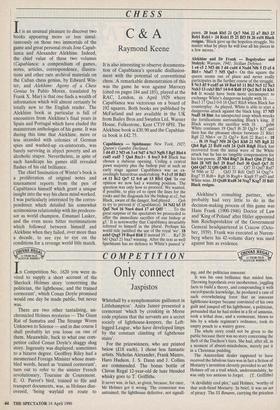CHESS
C & A
Raymond Keene
It is an unusual pleasure to discover two books appearing more or less simul- taneously on those two immortals of the game and great personal rivals Jose Capab- lanca and Alexander Alekhine. Indeed, the chief value of these two volumes (Capablanca: a compendium of games, notes, articles, correspondence, illustra- tions and other rare archival materials on the Cuban chess genius, by Edward Win- ter; and Alekhine: Agony of a Chess Genius by Pablo Moran, translated by Frank X. Mur) is that one finds a wealth of information which will almost certainly be totally new to the English reader. The Alekhine book in particular is full of encounters from Alekhine's final years in Spain and Portugal which have eluded the mainstream anthologies of his game. It was during this time that Alekhine, more or less stranded with colonies of German spies and washed-up ex-aristocrats, was barely surviving in abject poverty and an alcoholic stupor. Nevertheless, in spite of such handicaps his games still revealed flashes of his old brilliance.
The chief fascination of Winter's book is a proliferation of original notes and tournament reports from the pen of Capablanca himself which grant a unique insight into the way his chess mind worked. I was particularly interested by the corres- pondence which detailed his somewhat acrimonious relationship with his predeces- sor as world champion, Emanuel Lasker, and the even more bitter recriminations which followed between himself and Alekhine when they failed, over more than a decade, to see eye to eye on the conditions for a revenge world title match. It is also interesting to observe documenta- tion of Capablanca's sporadic disillusion- ment with the potential of conventional chess. A remarkable demonstration of this was the game he won against Maroczy (cited on pages 184 and 185), played at the RAC, London, in April 1929 where Capablanca was victorious on a board of 192 squares. Both books are published by McFarland and are available in the UK from Bailey Bros and Swinfen Ltd, Warner House, Folkestone, Kent CT19 6PH. The Alekhine book is £30.90 and the Capablan- ca book is £42.75.
Capablanca — Spielmann: New York, 1927; Queen's Gambit Declined.
1 d4 d5 2 Nf3 e6 3 c4 Nd7 4 Nc3 Ngf6 5 Bg5 Bb4 6 cxd5 exd5 7 Qa4 Bxc3+ 8 bxc3 0-0 Black has chosen a dubious opening. Ceding a central pawn majority plus the bishop pair at such an early stage against Capablanca was an ex- ceedingly hazardous undertaking. 9 e3 c5 10 Bd3 c4 11 Bc2 Qe7 12 0-0 a6 13 Rfel Qe6 'In our opinion we now had a winning position. The question was only how to proceed. We wanted, if possible, to play e4 to open the lines for the rooks and the diagonals for the bishop at c2, but Black, aware of the danger, had played . . . Qe6 to try to prevent it' (Capablanca). 14 Nd2 b5 15 Qa5 Ne4 16 Nxe4 dxe4 17 a4 Qd5 `. . . To the great surprise of the spectators we proceeded to offer the immediate sacrifice of our bishop at g5.' It is noteworthy that Capablanca invariably referred to himself in the plural. Perhaps his world title justified the use of the royal 'we'. 18 axb5 Qxg5 19 Bxe4 Rb8 If instead 19 . . . Ra7 20 b6! Qxa5 21 bxa7 winning. After the text as well Spielmann has no defence to White's passed 'a'
pawn. 20 bxa6 Rb5 21 Qc7 Nb6 22 a7 Bh3 23 Rebl Rxbl + 24 Rxbl 13 25 Bf3 f4 26 exf4 Black resigns. 'Black gave up the hopeless struggle. No matter what he plays he will lose all his pieces in a few moves.'
Alekhine and Dr Frank — Bogolyubov and Stolzyk: Warsaw, 1941; Sicilian Defence. 1 e4 c5 2 Nf3 d6 3 d4 cxd4 4 Nxd4 Nf6 5 f3 e5 6 BbS+ Nbd7 7 Nf5 QaS+ On this square the queen seems out of place and never really participates in the further course of the struggle. 8 Nc3 d5 9 exd5 a6 10 Ba4 b5 11 Bb3 Nc5 12 Ne3 Nxb3 13 cxb3 Bbl 14 0-0 Rd8 15 Qe2 Bc5 16 Khl 0-0 It would have been more circumspect to exchange White's dangerous knight with 16 . . . Bxe3 17 Qxe3 0-0 18 Qxe5 Rfe8 when Black has counterplay. As played, White is able to start a dangerous attack against the black king. 17 Nf5 NxdS 18 Bh6 An unexpected coup which wrecks the fortifications surrounding Black's king. If Black accepts the sacrifice with 18 . . . gxh6 White continues 19 Qxe5 f6 20 Qg3+ Kf7 and then has the pleasant choice between 21 Rfel Rg8 22 Nh6+ or 21 Qg7+ Ke6 22 Rae 1 +. 18 . . . f6 19 Nxg7 Nf4 20 Qel Kh8 21 Nf5 Rg8 22 Qh4 Rg6 23 Bxf4 exf4 24 Qxf4 Rdg8 Black has recovered from the initial wave of the White attack but he has no tangible compensation for his lost pawns. 25 Nh4 R6g7 26 Rael Qb6 27 Re2 Bd4 28 Nf5 Be5 29 RxeS fxe5 30 Qxe5 Qc7 31 Qd4 Qd7 32 Qf6 Qd8 If 32 . . . Qf7 33 Qxf7 Rxf7 34 Nh6 or 32 . . . Qd3 33 Rdl Qxf3 34 Qxg7+ Rxg7 35 Rd8+ Rg8 36 Rxg8+ Kxg8 37 gxf3 and White wins. 33 Qxd8 Rxd8 34 Nxg7 Kxg7 35 Rdl Black resigns.
Alekhine's consulting partner, who probably had very little to do in the decision-making process of this game was Hans Frank (1900-1946) Doctor of Law and 'King of Poland' after Hitler appointed him Reichsprotektor of the Government General headquartered in Cracow (Octo- ber, 1939). Frank was executed at Nurem- berg where his 42-volume diary was used against him as evidence.


















































 Previous page
Previous page